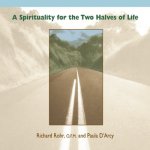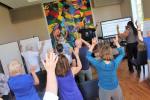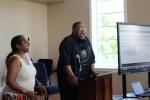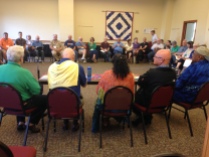 [This blog provides the Opening Comments for my lectionary webpage on Proper 20A, prompted by the texts of Jonah 3:10-4:11 and Matthew 20:1-16, the Parable of the Workers in the Vineyard.]
[This blog provides the Opening Comments for my lectionary webpage on Proper 20A, prompted by the texts of Jonah 3:10-4:11 and Matthew 20:1-16, the Parable of the Workers in the Vineyard.]
One of the most important books I’ve ever read is Richard Rohr‘s Falling Upward: A Spirituality for the Two Halves of Life. It did nothing less than articulate my own spiritual journey. Ever since my teenage years, I could not be satisfied with the God whom I was being taught. I considered myself “agnostic” in my late teens, early twenties. I was like Ivan Karamazov in Dostoevsky‘s The Brothers Karamazov — an intellectual who couldn’t make sense of the suffering in the world. So when I decided to go to seminary at about age 24, it was not just a vocational calling. The decision was also about needing to see if I could begin to encounter a new God. I sought to be more like Alyosha Karamazov, on a spiritual journey with guides like Father Zosima. In growing up, I had already experienced gracious pastors and my own father who encouraged my spiritual questioning and planted the seeds for a new encounter.
At the seminary and in my subsequent career as a parish pastor, I gradually began to encounter a different God than the one we are taught. The first pivotal guide was Jürgen Moltmann, especially his The Crucified God. Even the book description on the cover expresses my main issue:
Moltmann proposes that suffering is not a problem to be solved but instead that suffering is an aspect of God’s very being: God is love, and love invariably involves suffering.
While reading and studying theologians like Moltmann was important, even more so have been the countless parishioners over the years who have given me the privilege of sharing their lived lives with them — from the moments of great joy and celebration to the moments of great sorrow and suffering. How does one encounter God in all the moments of lived life?
Reading Rohr‘s Falling Upward when it was published in 2011, and sharing it with a Bible study group shortly thereafter, put new words with my own lived spiritual journey. His thesis is that the human journey of lived life generally encounters two quite different Gods connected with the notion of ‘two halves of life.’
There is much evidence on several levels that there are at least two major tasks to human life. The first task is to build a strong “container” or identity; the second is to find the contents that the container was meant to hold. The first task we take for granted as the very purpose of life, which does not mean we do it well. The second task, I am told, is more encountered than sought; few arrive at it with much preplanning, purpose, or passion. So you might wonder if there is much point in providing a guide to the territory ahead of time. Yet that is exactly why we must. It is vitally important to know what is coming and being offered to all of us. (Falling Upward, xiii)
So the first half is about constructing, with a lot of help from one’s culture, a safe container. It involves the legal structuring in a culture and the personal stories that shape our self-understanding.
I cannot think of a culture in human history, before the present postmodern era, that did not value law, tradition, custom, authority, boundaries, and morality of some clear sort. These containers give us the necessary security, continuity, predictability, impulse control, and ego structure that we need, before the chaos of real life shows up. Healthily conservative people tend to grow up more naturally and more happily than those who receive only free-form, “build it yourself’ worldviews, in my studied opinion.
Here is my conviction: without law in some form, and also without butting up against that law, we cannot move forward easily and naturally. (25)
An important word in the above description is “necessary.” Human beings fail to thrive without a healthy experience in building a safe container. And part of the safety and goodness in this container is having a transcendent guarantor: a God who presides over, justifies, and gives secure structure to the edifice.
But since this is only the first basic stage of becoming human, it bears the imprint of its beginning: a dualistic structure from the ‘original dualisms’: me-other of the forming ego, and us-them of the structuring culture. From these derive all the other many dualisms that give meaning to the container built in the first half of life: good-evil, clean-unclean, fair-unfair (or just-unjust), successful-unsuccessful, rich-poor, deserving-undeserving, blessing-curse, reward-punishment, et al. This is the “way of the world” that all young people must learn in growing up. And the God who presides over it is the ultimate creator and arbiter of all these dualisms.
So what happens to prompt movement into a second half of life? Life happens. And among the lived moments are always moments that challenge the basic structure of the container’s dualisms — moments that especially challenge the fair-unfair assumption — both positively at moments of wondrous grace but also negatively at moments of suffering undeserved evil. The latter moments often raise up shouts of, “Life is unfair!”
Such moments also call God into question as the arbiter of fair and unfair. And so the work of the second half of life begins, seeking a new spirituality — and perhaps a new encounter with God that helps to begin to make sense out of life as lived. It doesn’t do away with the container from the first half of life. But it makes sense differently of the dualisms. It begins to experience them within a unity of all that is. And the experience of God changes, too, from that of keeper of the dualisms to that of unifier. And as we gleaned from a theologian like Moltmann above, the suffering is not a problem to be solved but something we experience in the unity of God. Suffering is part of God. But so is joy. In God’s unifying presence, suffering and joy can be held together in love.
Above all, in the second half of life we come to experience life as neither fair nor unfair. Life simply is. “It is what it is.” And when we are most fortunate, that “isness” is . . . Grace, gift.
So why these deep ponderings on the occasion of this text from Matthew — or the story of Jonah, for that matter? I believe that the parables of the past two Sundays (including Jonah) are basically invitations into a spirituality for the second half of life. As I reflected last week, the Parable of the Unforgiving Servant is more than a conventional story of crime and punishment. The servant has been given the gracious version of challenging life’s fairness; he has undeservedly, by this world’s standards, been forgiven an unpayable debt. As such, he is invited into a world of Grace, where debts are no longer kept. When he continues to keep a relatively small, payable debt with his fellow servant, he doesn’t simply get punished for a wrong-doing. He steps out of the world of Grace offered to him and back into the world of debt-keeping, where slavery or jail cells await those who can’t keep their debts.
This week’s Parable of the Workers in the Vineyard offers us a similar and even more straightforward invitation into a whole new world of Grace, a world beyond the rules of fairness we were taught to a world of overflowing generosity.
But how does this spirituality for the second half of life work for the moments of painful loss and suffering? To be honest, I can’t say I’ve ‘arrived’ yet at the fullness of living in a world of such grace so that not even moments of great personal loss could extinguish the grace. I only glimpse it and hope that I will be far enough along on this journey to survive life’s greatest losses. And even if I’m not yet far enough along, I have experienced deeply enough the Crucified God in Christ to trust that God will be present with me in my times of greatest suffering, and then can help lead me out on the other side. “Even though I walk through the darkest valley, I fear no evil; for you are with me; your rod and your staff — they comfort me.”
 One story has become quintessential for me in my own spiritual journey. Richard Rohr, shortly after releasing the book, held a conference on “A Spirituality for the Two Halves of Life.” And he invited speaker Paula D’Arcy to co-lead with him, whose personal story very much adds the dimension of facing life’s greatest losses. When she was 27, and pregnant with her second child, her husband and first child were killed in an accident caused by a drunk driver. Paula tells many stories of being shaken out of the good and necessary spirituality in the first half of her life but then also the long journey into a spirituality for the second half of her life.
One story has become quintessential for me in my own spiritual journey. Richard Rohr, shortly after releasing the book, held a conference on “A Spirituality for the Two Halves of Life.” And he invited speaker Paula D’Arcy to co-lead with him, whose personal story very much adds the dimension of facing life’s greatest losses. When she was 27, and pregnant with her second child, her husband and first child were killed in an accident caused by a drunk driver. Paula tells many stories of being shaken out of the good and necessary spirituality in the first half of her life but then also the long journey into a spirituality for the second half of her life.
But it is a story that she tells about her friend Susan that stays with me. It is at a time when they are both older. Paula has finally moved through her darkness into a mature spirituality of Grace. Susan has also moved on from the first half of her life, having coped with a divorce from an evangelical Christian and then finding new life in marrying a Jewish man. Paula happened to be visiting Susan (they no longer lived in the same town) when Susan received the same terrible news that had rocked Paula’s world: Susan’s 22 year-old son Mark, on his way home from college, had been hit by a drunk driver and killed. Paula accompanied her friend to the hospital but initially gave her the privacy of going into the Emergency Room alone to be with her son’s dead body. After a long time, Susan called for her friend to join her, gently saying to her when she arrived,
“Please tell me the truth. He never was really mine, was he?”
Paula answered simply, “Susan, none of them are ours. It’s all gift.”
“If that is true, then he can’t be taken from me. If he was gift, then at this moment I will give him back.” And Susan took Paula’s hand and one of her son’s hands, raised her eyes to the heavens, and prayed, “God, before me is the greatest gift you ever gave me. And now I give it back. Thank you. Thank you for all these years.”
I don’t know if I could pray such a prayer in a similar situation. But I believe that this is what it looks like to live in the world of Grace, where times of sorrow are held together with times of joy and love. It is a world in which all law is fulfilled in the deep and wondrous mystery of Love.
[This blog provides the Opening Comments for my lectionary webpage on Proper 20A. For more those texts, go to Proper 20A]
One of the most important books I’ve ever read is Richard Rohr‘s Falling Upward: A Spirituality for the Two Halves of Life. It did nothing less than articulate my own spiritual journey. Ever since my teenage years, I could not be satisfied with the God whom I was being taught. I considered myself “agnostic” in my late teens, early twenties. I was like Ivan Karamazov in Dostoevsky‘s The Brothers Karamazov — an intellectual who couldn’t make sense of the suffering in the world. So when I decided to go to seminary at about age 24, it was not just a vocational calling. The decision was also about needing to see if I could begin to encounter a new God. I sought to be more like Alyosha Karamazov, on a spiritual journey with guides like Father Zosima. In growing up, I had already experienced gracious pastors and my own father who encouraged my spiritual questioning and planted the seeds for a new encounter.
At the seminary and in my subsequent career as a parish pastor, I gradually began to encounter a different God than the one we are taught. The first pivotal guide was Jürgen Moltmann, especially his The Crucified God. Even the book description on the cover expresses my main issue:
Moltmann proposes that suffering is not a problem to be solved but instead that suffering is an aspect of God’s very being: God is love, and love invariably involves suffering.
While reading and studying theologians like Moltmann was important, even more so have been the countless parishioners over the years who have given me the privilege of sharing their lived lives with them — from the moments of great joy and celebration to the moments of great sorrow and suffering. How does one encounter God in the all the moments of lived life?
Reading Rohr‘s Falling Upward, when it was published in 2011, and sharing it with a Bible study group shortly thereafter, put new words with my own lived spiritual journey. His thesis is that the human journey of lived life generally encounters two quite different Gods connected with the notion of ‘two halves of life.’
There is much evidence on several levels that there are at least two major tasks to human life. The first task is to build a strong “container” or identity; the second is to find the contents that the container was meant to hold. The first task we take for granted as the very purpose of life, which does not mean we do it well. The second task, I am told, is more encountered than sought; few arrive at it with much preplanning, purpose, or passion. So you might wonder if there is much point in providing a guide to the territory ahead of time. Yet that is exactly why we must. It is vitally important to know what is coming and being offered to all of us. (Falling Upward, xiii)
So the first half is about constructing, with a lot of help from one’s culture, a safe container. It involves the legal structuring in a culture and the stories that shape our self-understanding.
I cannot think of a culture in human history, before the present postmodern era, that did not value law, tradition, custom, authority, boundaries, and morality of some clear sort. These containers give us the necessary security, continuity, predictability, impulse control, and ego structure that we need, before the chaos of real life shows up. Healthily conservative people tend to grow up more naturally and more happily than those who receive only free-form, “build it yourself’ worldviews, in my studied opinion.
Here is my conviction: without law in some form, and also without butting up against that law, we cannot move forward easily and naturally. (25)
An important word in the above description is “necessary.” Human beings fail to thrive without a healthy experience in building a safe container. And part of the safety and goodness in this container is having a transcendent guarantor: a God who presides over, justifies, and gives secure structure to the edifice.
But since this is only the first basic stage of becoming human, it bears the imprint of its beginning: a dualistic structure from the first original dualisms: me-other of the forming ego, and us-them of the structuring culture. From these derive all the other many dualisms that give meaning to the container built in the first half of life: good-evil, clean-unclean, fair-unfair (or just-unjust), successful-unsuccessful, rich-poor, deserving-undeserving, blessing-curse, reward-punishment, et al. This is the “way of the world” that all young people must learn in growing up. And the God who presides over it is the ultimate creator and arbiter of all these dualisms.
So what happens to prompt movement to a second half of life? Life happens. And among the lived moments are always moments that challenge the basic structure of the container’s dualisms — moments that especially challenge the fair-unfair assumption, both positively at moments of wondrous grace and negatively at moments of suffering undeserved evil. Moments, in short, of shouting out, “Life is unfair!”
Such moments also call God into question as the arbiter of fair and unfair. And so the work of the second half of life begins, seeking a new spirituality — and perhaps a new encounter with God that helps to begin to make sense out of life as lived. It doesn’t do away with the container from the first half of life. But it makes sense differently of those dualisms. It begins to experience them within a unity of all that is. And the experience of God changes, too, from that of keeper of the dualisms to that of unifier. And as we gleaned from a theologian like Moltmann above, the suffering is not a problem to be solved but something we experience in the unity of God. Suffering is part of God. But so is joy. In God’s unifying presence, suffering and joy can be held together.
Above all, in the second half of life we come to experience life as neither fair nor unfair. Life simply is. “It is what it is.” And when we are most fortunate, that “isness” is . . . Grace, gift.
So why these deep ponderings on the occasion of this text from Matthew — or the story of Jonah, for that matter? I believe that the parables of the past two Sundays (including Jonah) are basically invitations into a spirituality for the second half of life. As I reflected last week, the Parable of the Unforgiving Servant is more than a conventional story of crime and punishment. The servant has been given the gracious version of challenging life’s fairness; he has undeservedly, by this world’s standards, been forgiven an unpayable debt. As such, he is invited into a world of Grace, where debts are no longer kept. When he continues to keep a relatively small, payable debt with his fellow servant, he doesn’t simply get punished for a wrong-doing. He steps out of the world of Grace offered to him and back into the world of debt-keeping, where slavery or jail cells await those who can’t keep their debts.
This week’s Parable of the Vineyard Workers gives us a similar invitation into a whole new world of Grace, a world beyond the rules of fairness we were taught to a world of overflowing generosity.
But how does this spirituality for the second half of life work for the moments of painful loss and suffering? To be honest, I can’t say I’ve ‘arrived’ yet at the fullness of living in a world of such grace such that not even moments of great personal loss can extinguish the grace. I only glimpse it and hope that I will be far enough along on this journey to survive life’s greatest losses. And even if I’m not yet far enough along, I have experienced the Crucified God in Christ deeply enough to trust that God will be present with me in my times of greatest suffering, and then can help to bring me out on the other side. “Even though I walk through the darkest valley, I fear no evil; for you are with me; your rod and your staff — they comfort me.”
 One story has become quintessential for me in my own spiritual journey. Richard Rohr, shortly after releasing the book, held a conference on “A Spirituality for the Two Halves of Life,” and he invited speaker Paula D’Arcy to lead with him, whose personal story very much adds the dimension of facing life’s greatest losses. When she was 27, and pregnant with her second child, her husband and first child were killed in an accident with a drunk driver. Paula tells many stories of being shaken out of the good and necessary spirituality in the first half of her life but then also the long journey into a spirituality for the second half of her life.
One story has become quintessential for me in my own spiritual journey. Richard Rohr, shortly after releasing the book, held a conference on “A Spirituality for the Two Halves of Life,” and he invited speaker Paula D’Arcy to lead with him, whose personal story very much adds the dimension of facing life’s greatest losses. When she was 27, and pregnant with her second child, her husband and first child were killed in an accident with a drunk driver. Paula tells many stories of being shaken out of the good and necessary spirituality in the first half of her life but then also the long journey into a spirituality for the second half of her life.
But it is a story that she tells about her friend Susan that stays with me. It is at a time when they are both older. Paula has finally moved through her darkness into a mature spirituality of Grace. Susan has also moved on from the first half of her life, coping with a divorce from an evangelical Christian and then finding new life in marrying a Jewish man. Paula happened to be visiting Susan (they no longer lived in the same town) when Susan received the same terrible news that had rocked Paul’s world: Susan’s 22 year-old son Mark, on his way home from college, had been hit by a drunk driver and killed. Paula accompanied her friend to the hospital but initially gave her the privacy of going in the Emergency Room alone to be with her son’s dead body. After a long time, Susan called for her friend to join her, gently saying to her when she arrived,
“Please tell me the truth. He never was really mine, was he?”
She had had the experience of owning things and deserving things. Paula answered, “Susan, none of them are ours. It’s all gift.”
“If that is true, then he can’t be taken from me. If he was gift, then at this moment I will give him back.” And Susan took Paula’s hand and one of her son’s hands, raised her eyes to the heavens, and prayed, “God, before me is the greatest gift you ever gave me. And now I give it back. Thank you. Thank you for all these years.”
I don’t know if I could pray such a prayer in a similar situation. But I believe that this is what it looks like to live in the world of Grace, where times of sorrow are held together with times of joy and love. It is a world in which all law is fulfilled in Love.
One of the most important books I’ve ever read is Richard Rohr‘s Falling Upward: A Spirituality for the Two Halves of Life. It did nothing less than articulate my own spiritual journey. Ever since my teenage years, I could not be satisfied with the God whom I was being taught. I considered myself “agnostic” in my late teens, early twenties. I was like Ivan Karamazov in Dostoevsky‘s The Brothers Karamazov — an intellectual who couldn’t make sense of the suffering in the world. So when I decided to go to seminary at about age 24, it was not just a vocational calling. The decision was also about needing to see if I could begin to encounter a new God. I sought to be more like Alyosha Karamazov, on a spiritual journey with guides like Father Zosima. In growing up, I had already experienced gracious pastors and my own father who encouraged my spiritual questioning and planted the seeds for a new encounter.
At the seminary and in my subsequent career as a parish pastor, I gradually began to encounter a different God than the one we are taught. The first pivotal guide was Jürgen Moltmann, especially his The Crucified God. Even the book description on the cover expresses my main issue:
Moltmann proposes that suffering is not a problem to be solved but instead that suffering is an aspect of God’s very being: God is love, and love invariably involves suffering.
While reading and studying theologians like Moltmann was important, even more so have been the countless parishioners over the years who have given me the privilege of sharing their lived lives with them — from the moments of great joy and celebration to the moments of great sorrow and suffering. How does one encounter God in the all the moments of lived life?
Reading Rohr‘s Falling Upward, when it was published in 2011, and sharing it with a Bible study group shortly thereafter, put new words with my own lived spiritual journey. His thesis is that the human journey of lived life generally encounters two quite different Gods connected with the notion of ‘two halves of life.’
There is much evidence on several levels that there are at least two major tasks to human life. The first task is to build a strong “container” or identity; the second is to find the contents that the container was meant to hold. The first task we take for granted as the very purpose of life, which does not mean we do it well. The second task, I am told, is more encountered than sought; few arrive at it with much preplanning, purpose, or passion. So you might wonder if there is much point in providing a guide to the territory ahead of time. Yet that is exactly why we must. It is vitally important to know what is coming and being offered to all of us. (Falling Upward, xiii)
So the first half is about constructing, with a lot of help from one’s culture, a safe container. It involves the legal structuring in a culture and the stories that shape our self-understanding.
I cannot think of a culture in human history, before the present postmodern era, that did not value law, tradition, custom, authority, boundaries, and morality of some clear sort. These containers give us the necessary security, continuity, predictability, impulse control, and ego structure that we need, before the chaos of real life shows up. Healthily conservative people tend to grow up more naturally and more happily than those who receive only free-form, “build it yourself’ worldviews, in my studied opinion.
Here is my conviction: without law in some form, and also without butting up against that law, we cannot move forward easily and naturally. (25)
An important word in the above description is “necessary.” Human beings fail to thrive without a healthy experience in building a safe container. And part of the safety and goodness in this container is having a transcendent guarantor: a God who presides over, justifies, and gives secure structure to the edifice.
But since this is only the first basic stage of becoming human, it bears the imprint of its beginning: a dualistic structure from the first original dualisms: me-other of the forming ego, and us-them of the structuring culture. From these derive all the other many dualisms that give meaning to the container built in the first half of life: good-evil, clean-unclean, fair-unfair (or just-unjust), successful-unsuccessful, rich-poor, deserving-undeserving, blessing-curse, reward-punishment, et al. This is the “way of the world” that all young people must learn in growing up. And the God who presides over it is the ultimate creator and arbiter of all these dualisms.
So what happens to prompt movement to a second half of life? Life happens. And among the lived moments are always moments that challenge the basic structure of the container’s dualisms — moments that especially challenge the fair-unfair assumption, both positively at moments of wondrous grace and negatively at moments of suffering undeserved evil. Moments, in short, of shouting out, “Life is unfair!”
Such moments also call God into question as the arbiter of fair and unfair. And so the work of the second half of life begins, seeking a new spirituality — and perhaps a new encounter with God that helps to begin to make sense out of life as lived. It doesn’t do away with the container from the first half of life. But it makes sense differently of those dualisms. It begins to experience them within a unity of all that is. And the experience of God changes, too, from that of keeper of the dualisms to that of unifier. And as we gleaned from a theologian like Moltmann above, the suffering is not a problem to be solved but something we experience in the unity of God. Suffering is part of God. But so is joy. In God’s unifying presence, suffering and joy can be held together.
Above all, in the second half of life we come to experience life as neither fair nor unfair. Life simply is. “It is what it is.” And when we are most fortunate, that “isness” is . . . Grace, gift.
So why these deep ponderings on the occasion of this text from Matthew — or the story of Jonah, for that matter? I believe that the parables of the past two Sundays (including Jonah) are basically invitations into a spirituality for the second half of life. As I reflected last week, the Parable of the Unforgiving Servant is more than a conventional story of crime and punishment. The servant has been given the gracious version of challenging life’s fairness; he has undeservedly, by this world’s standards, been forgiven an unpayable debt. As such, he is invited into a world of Grace, where debts are no longer kept. When he continues to keep a relatively small, payable debt with his fellow servant, he doesn’t simply get punished for a wrong-doing. He steps out of the world of Grace offered to him and back into the world of debt-keeping, where slavery or jail cells await those who can’t keep their debts.
This week’s Parable of the Vineyard Workers gives us a similar invitation into a whole new world of Grace, a world beyond the rules of fairness we were taught to a world of overflowing generosity.
But how does this spirituality for the second half of life work for the moments of painful loss and suffering? To be honest, I can’t say I’ve ‘arrived’ yet at the fullness of living in a world of such grace such that not even moments of great personal loss can extinguish the grace. I only glimpse it and hope that I will be far enough along on this journey to survive life’s greatest losses. And even if I’m not yet far enough along, I have experienced the Crucified God in Christ deeply enough to trust that God will be present with me in my times of greatest suffering, and then can help to bring me out on the other side. “Even though I walk through the darkest valley, I fear no evil; for you are with me; your rod and your staff — they comfort me.”
 One story has become quintessential for me in my own spiritual journey. Richard Rohr, shortly after releasing the book, held a conference on “A Spirituality for the Two Halves of Life,” and he invited speaker Paula D’Arcy to lead with him, whose personal story very much adds the dimension of facing life’s greatest losses. When she was 27, and pregnant with her second child, her husband and first child were killed in an accident with a drunk driver. Paula tells many stories of being shaken out of the good and necessary spirituality in the first half of her life but then also the long journey into a spirituality for the second half of her life.
One story has become quintessential for me in my own spiritual journey. Richard Rohr, shortly after releasing the book, held a conference on “A Spirituality for the Two Halves of Life,” and he invited speaker Paula D’Arcy to lead with him, whose personal story very much adds the dimension of facing life’s greatest losses. When she was 27, and pregnant with her second child, her husband and first child were killed in an accident with a drunk driver. Paula tells many stories of being shaken out of the good and necessary spirituality in the first half of her life but then also the long journey into a spirituality for the second half of her life.
But it is a story that she tells about her friend Susan that stays with me. It is at a time when they are both older. Paula has finally moved through her darkness into a mature spirituality of Grace. Susan has also moved on from the first half of her life, coping with a divorce from an evangelical Christian and then finding new life in marrying a Jewish man. Paula happened to be visiting Susan (they no longer lived in the same town) when Susan received the same terrible news that had rocked Paul’s world: Susan’s 22 year-old son Mark, on his way home from college, had been hit by a drunk driver and killed. Paula accompanied her friend to the hospital but initially gave her the privacy of going in the Emergency Room alone to be with her son’s dead body. After a long time, Susan called for her friend to join her, gently saying to her when she arrived,
“Please tell me the truth. He never was really mine, was he?”
She had had the experience of owning things and deserving things. Paula answered, “Susan, none of them are ours. It’s all gift.”
“If that is true, then he can’t be taken from me. If he was gift, then at this moment I will give him back.” And Susan took Paula’s hand and one of her son’s hands, raised her eyes to the heavens, and prayed, “God, before me is the greatest gift you ever gave me. And now I give it back. Thank you. Thank you for all these years.”
I don’t know if I could pray such a prayer in a similar situation. But I believe that this is what it looks like to live in the world of Grace, where times of sorrow are held together with times of joy and love. It is a world in which all law is fulfilled in Love.
 [This blog provides the Opening Comments for my lectionary webpage on Proper 20A, prompted by the texts of Jonah 3:10-4:11 and Matthew 20:1-16, the Parable of the Workers in the Vineyard.]
[This blog provides the Opening Comments for my lectionary webpage on Proper 20A, prompted by the texts of Jonah 3:10-4:11 and Matthew 20:1-16, the Parable of the Workers in the Vineyard.] One story has become quintessential for me in my own spiritual journey. Richard Rohr, shortly after releasing the book, held a conference on “A Spirituality for the Two Halves of Life.” And he invited speaker Paula D’Arcy to co-lead with him, whose personal story very much adds the dimension of facing life’s greatest losses. When she was 27, and pregnant with her second child, her husband and first child were killed in an accident caused by a drunk driver. Paula tells many stories of being shaken out of the good and necessary spirituality in the first half of her life but then also the long journey into a spirituality for the second half of her life.
One story has become quintessential for me in my own spiritual journey. Richard Rohr, shortly after releasing the book, held a conference on “A Spirituality for the Two Halves of Life.” And he invited speaker Paula D’Arcy to co-lead with him, whose personal story very much adds the dimension of facing life’s greatest losses. When she was 27, and pregnant with her second child, her husband and first child were killed in an accident caused by a drunk driver. Paula tells many stories of being shaken out of the good and necessary spirituality in the first half of her life but then also the long journey into a spirituality for the second half of her life.
























































